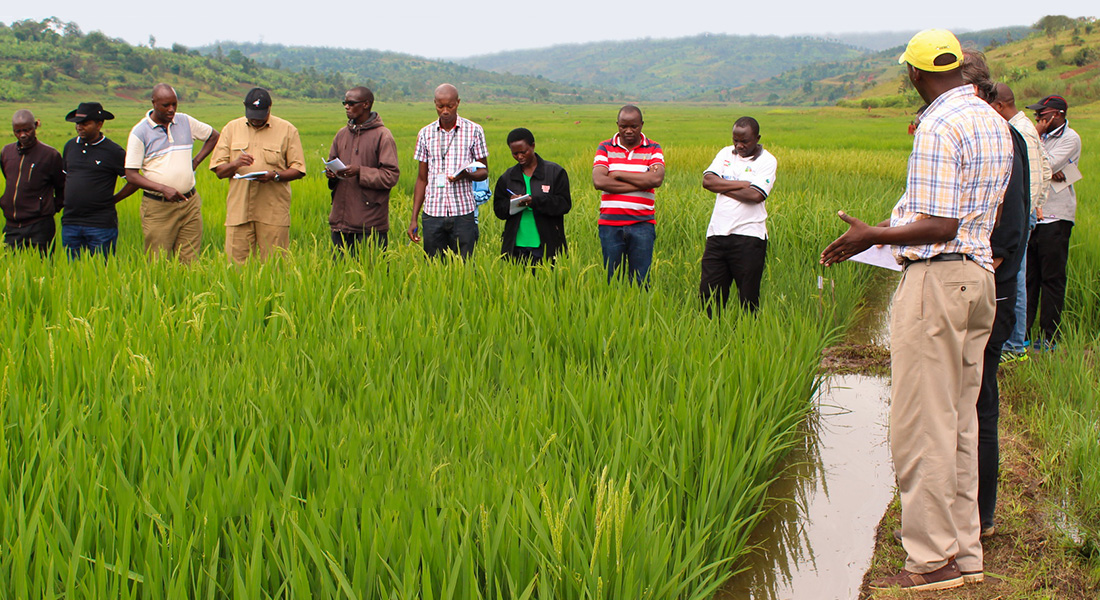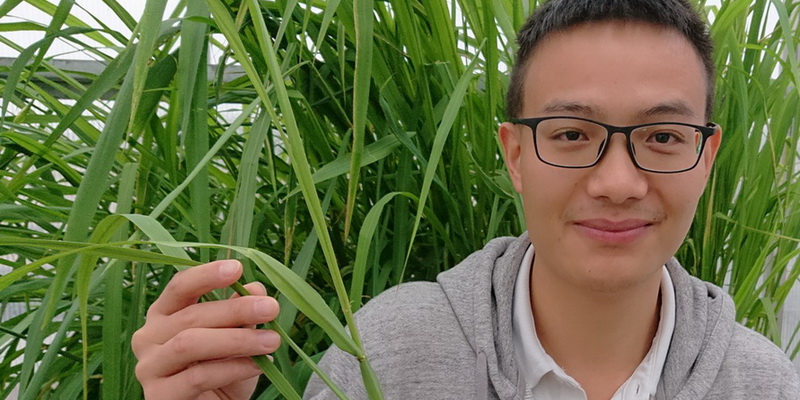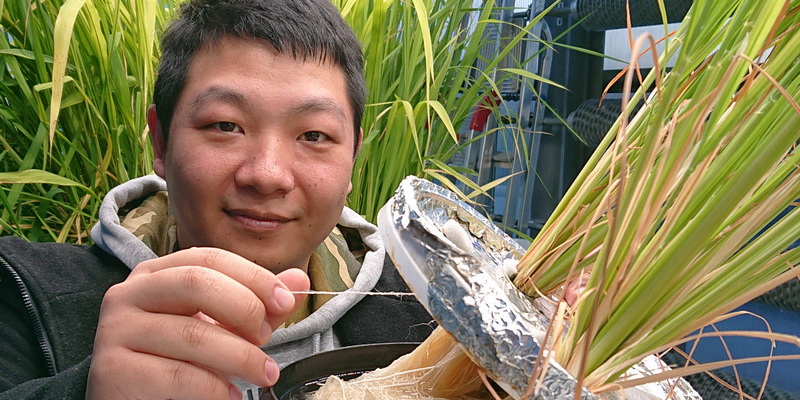Climate-smart African rice

We will identify novel genes or QTLs involved in flood or salinity tolerance to breed climate-smart rice cultivars for East Africa. We use African rice and wild rice relatives to uncover trait capacities for flood or salinity tolerance. The project output is 1-2 high-yielding rice cultivars that helps sustain rice production under abiotic stress.
Professor Ole Pedersen coordinator of Climate-smart rice explains: We have gathered leading scientists in the field with the aim of delivering modern rice cultivars to farmers in Africa in order to ease the calamities of the ongoing climate changes. This project will also result in novel scientific discoveries and thereby strengthen research in Africa and Denmark.
What is the role of the root barrier to radial oxygen loss in restriction salt intrusion in roots?
We have indications that this barrier can reduce salt update from saline soils and rice cultivars with constitutive expression of this barrier would then possess improved resilience to salt stress.
What is the role of gas film formation for survival during complete submergence?
Leaf gas films develop on superhydrophobic leaves and form an interface between leaf tissue and floodwater that greatly enhances exchange of oxygen and carbon dioxide. Moreover, the interface may also restrict salt intrusion in situations with saline floods. New rice cultivars with prolonged gas film retention would consequently show improved flood and salinity tolerance.
Mechanistic phenotyping of root barriers and leaf gas films
Postdoctoral fellow Dr. Max Herzog
A limited number of genotypes of African rice (Oryza glaberrima) along with selected wild rice relatives will be analysed in details in the research labs at the Department of Biology, University of Copenhagen. We will use contemporary state-of-art techniques to assess gas film retention under fresh or saline flood conditions using a buoyancy approach in combination with direct measurements of leaf hydrophobicity. The role of the root barrier to radial oxygen loss in restriction salt intrusion via the root apoplast will be studied using flame photometry and tissue osmolarity. The mechanistic understanding of responses to abiotic stress is required in order to advise in the subsequent process of marker-assisted breeding where individual QTLs are pyramidize in candidate cultivars.
The component involving species of wild rice is particularly exciting since these are widely understudied. At the same time, species of wild rice inhabits natural habitats ranging from dry uplands to permanent wetland and so the potential for discovering traits that confer tolerance to flood or salinity is high. Consequently, this sub-project is expected to feed essential information into the breeding component in addition to producing novel scientific insight into tolerance to abiotic stress in the rice and its wild relatives.
Lucas Peralta - fully funded via the Independent Research Fund Denmark and working full-time on the project
Shuai Tong - fully funded via China Scholarship Council and working full-time on the project
Zhiwei Song - fully funded via China Scholarship Council and working full-time on the project
- Sokoine University of Agriculture in Morogoro, Tanzania
Prof. Susan Nchimbi Msolla has a record of accomplishment in genetics research on abiotic stresses and SUA is the major public agriculture university, with required facilities and with mandate of training agriculture scientists, well recognized nationally and regionally as a higher education institute. - Tanzanian Agricultural Seed Agency in Morogoro, Tanzania
Dr. Sophia Kashenge-Killenga. She is acting Chief Executive officer for Agricultural Seed Agency (ASA). This is a Tanzanian Government Executive Agency established under the Executive Agencies. ASA is responsible for ensuring availability of high quality and affordable agricultural seeds in Tanzania on the sustainable basis. - International Rice Research Institute as represented by the East African hub in Nairobi, Kenya and IRRI Headquarters in Los Baños, the Philippines
Dr. Abdelbagi Ismail is a world-leading scientist on abiotic stresses in rice with emphasis on flood and salinity tolerance, and has played major roles in identifying and deploying stress tolerance related genes in rice varieties. He is currently leading IRRI’s rice program in Africa, with offices in Tanzania, Kenya, Burundi and Mozambique, with strong network of national partners to deploy the outcomes of this project to the whole region. - Department of Biology, University of Copenhagen, Denmark
Prof. Ole Pedersen is the leading rice scientist in Denmark and has been collaborating with IRRI, especially in flood tolerance, and will bring a great deal of expertise to characterize new germplasm for mechanisms of tolerance. His role in the recent discovery of the LGF1 gene for submergence tolerance in rice is a relevant example. UCPH will jointly host MSc and PhD students.
Training workshop are regularly being organized at IRRI’s headquarters in Los Baños, the Philippines and at IRRI Africa in Burundi. Training of staff also takes place at Sokoine University of Agriculture in Tanzania and for more advanced phenotyping in the Department of Biology at the University of Copenhagen.
See also the official protocol for Phenotyping protocols for abiotic stress tolerance in rice
1, 2, 3, 6, 8 & 10 December 2021
SNPs to GWAS: Advanced Course Course - apply here
15, 17, 19, 22 &24 November 2021
SNPs to GWAS: Introductory Course - apply here
22-26 November 2021
Basic Experimental Design and Data Analysis (BEDDA) - apply here
1-4 December 2020
Bioinformatics Training Course: SNPs to GWAS offered online by IRRI. This course will provide an introduction to tools for SNP discovery with a focus on filtering SNP data, performing diversity/population studies, methods for the discovery of genotype-phenotype associations through genome-wide association studies (GWAS) and undertaking post-GWAS studies to define candidate genes and identify supporting evidence for their involvement in traits. Participants will learn to use stand-alone and web-based software for data analyses. See this link for more information.
16 November 2020
Introduction to MicroResp techniques offered by UCPH. Oxygen consumption of plant tissue (aerobic respiration) is a key mechanism affected by submergence. With MicroResp, it is possible to measure oxygen consumption by e.g., root tips, root segments or other isolated plant tissues. The measurements can be taken at various temperatures and a contrasting oxygen availabilities. If needed, inhibitors can be introduced during measurements. This course is a one-day hands-on course aiming at identifying pitfalls and important steps to consider prior or during measurements. The course is taught by Prof. Pedersen, UCPH.
- Asbjørn Hansen (BSc) Drought responses in rice - download thesis
- Emil JW Anthony (BSc) Salinity tolerance of major crops - download thesis
- Johan E Kjær (MSc) Flood and salinity tolerance of wild rice - journal paper in preparation
- Line Dam Jessen (BSc) Gas film retention of African rice cultivars - download thesis
- Mathilde Bartholin (PUK) Gas film retention of wild rice - download thesis
- Max Stecher (MSc) Global distribution of wild rice - journal paper in preparation
- Trine LK Hansen (BSc) Water retention in root of rice - download thesis
- Kefrin Lutambi Plant Breeding (MSc) kefrinekennedy@gmail.com
- Lupakyiso Mwakyusa Plant Breeding (MSc) lupakisyomwakyusa01@gmail.com
- Mo’d Mmanga Omari Soil Science and Land Management (PhD) mmangaomary@gmail.com
- Nafeti Mheni Plant Breeding (PhD) mheni22@yahoo.co.uk
- Paulo Sulle Soil Science and Land Management (MSc) budasulle@gmail.com
Members
| Name | Title | Phone | |
|---|---|---|---|
| Ole Pedersen | Professor |
Funded by

Funding: DKK 12m from Danida
Period: April 2020 to March 2025
PI: Professor Ole Pedersen
Contact
Professor Ole Pedersen
Freshwater Biology Section
Department of Biology
Universitetsparken 4
DK-2100 Copenhagen Ø
Email: opedersen@bio.ku.dk
Phone: +45 23 74 76 41



